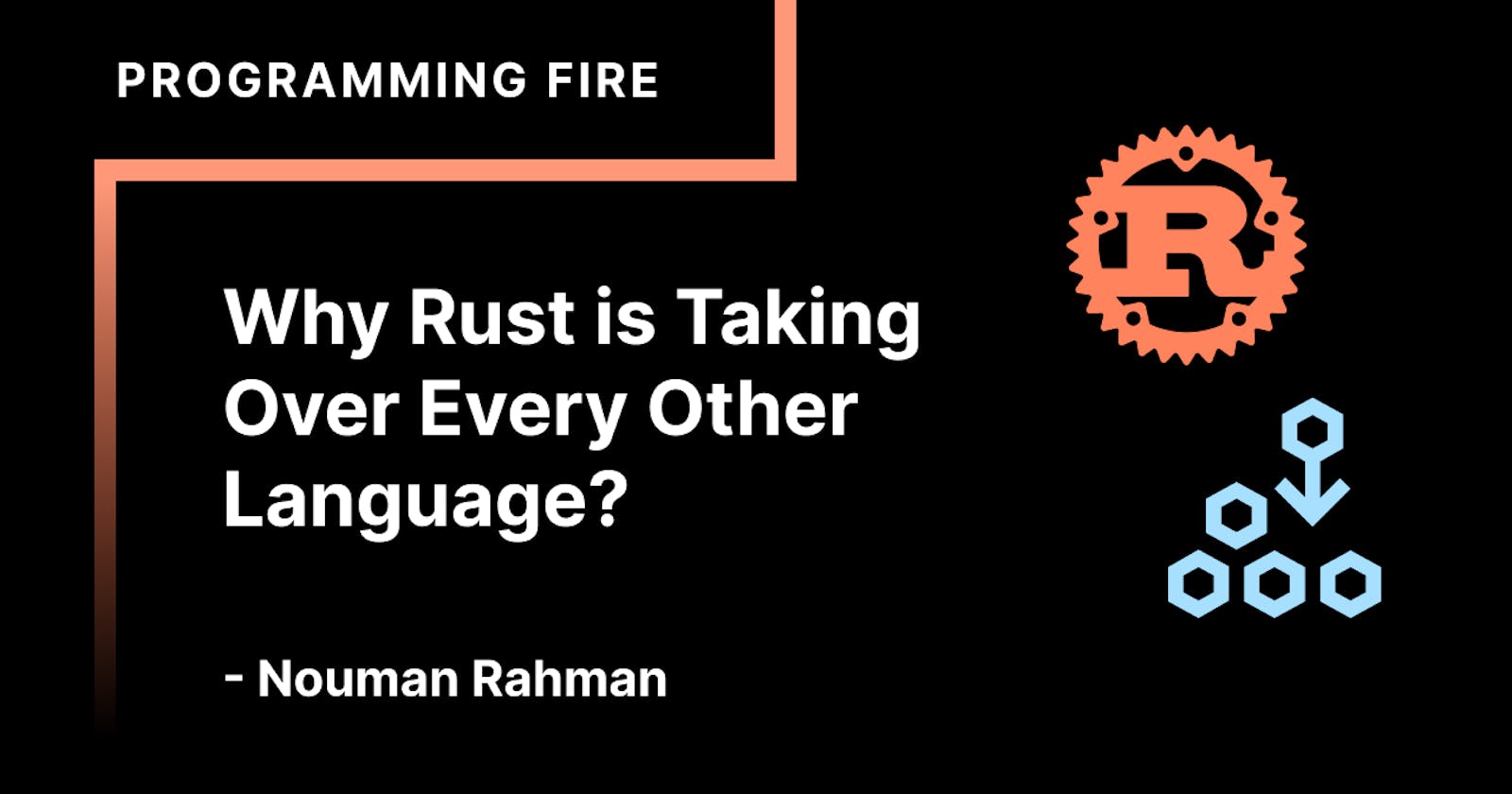Introduction
In the rapidly evolving landscape of programming languages, Rust has emerged as a powerful contender, attracting developers with its unique features and benefits. Rust combines performance, safety, and concurrency in a way that few other languages can match. It has gained significant traction and is being adopted by developers across various domains. In this article, we will explore the reasons why Rust is taking over every language and becoming a popular choice for modern software development.
Memory Safety and Concurrency:
One of the standout features of Rust is its strong emphasis on memory safety and concurrency. Rust's ownership and borrowing system ensures that memory errors, such as null pointer dereferences and data races, are caught at compile time. This eliminates a large class of bugs that are common in other languages, leading to more reliable and secure software.
Consider the following code snippet in Rust:
fn main() {
let mut data = vec![1, 2, 3];
let reference = &mut data;
reference.push(4);
println!("{:?}", data);
}
In this example, Rust prevents simultaneous mutable access to data by enforcing the borrowing rules. The code fails to compile because there are multiple mutable references to data at the same time. Rust's ownership system ensures that such data races are detected and prevented at compile time.
Performance and Efficiency
Rust is designed to deliver high performance and efficiency. It compiles machine code, enabling close-to-the-metal execution. The absence of runtime overhead and the ability to write low-level code with fine-grained control over memory allocation make Rust an excellent choice for systems programming and performance-critical applications.
Consider the following Rust code snippet that demonstrates the efficient handling of data:
fn main() {
let data = vec![1, 2, 3, 4];
let sum: u32 = data.into_iter().sum();
println!("Sum: {}", sum);
}
In this example, Rust leverages its iterator functionality and strong type inference to perform an efficient summation of a vector of integers. The code is concise, expressive, and performs optimally.
Cross-platform Compatibility
Rust provides excellent support for cross-platform development. It compiles machine code and has a small runtime, making it suitable for a wide range of platforms, including desktop, mobile, embedded systems, and the web. Rust's Cargo package manager simplifies dependency management and provides a consistent build system across different platforms.
Consider a scenario where you want to build a cross-platform application using Rust. By leveraging Rust's cross-compilation capabilities, you can easily compile your code for multiple target platforms with a simple command. For instance:
$ cargo build --target x86_64-pc-windows-gnu
$ cargo build --target arm-unknown-linux-gnueabihf
$ cargo build --target x86_64-apple-darwin
This demonstrates how Rust allows you to build your application for different platforms without requiring major modifications to your codebase.
Growing Ecosystem and Community
Rust has seen rapid growth in its ecosystem and community support. The official package manager, Cargo, offers a vast collection of libraries and frameworks that cover a wide range of use cases. From web development to systems programming, Rust has a vibrant ecosystem that continues to expand and mature.
The Rust community is known for its inclusivity, helpfulness, and focus on education. The Rust programming language itself encourages good practices and provides extensive documentation, making it easier for newcomers to get started and experienced developers to improve their skills.
Safety-Critical and Systems Programming
Rust's emphasis on safety and performance makes it an ideal choice for safety-critical and systems programming. Industries such as automotive, aerospace, finance, and networking rely on Rust for building robust and secure software systems.
Consider the following Rust code snippet that demonstrates safe concurrent programming using Rust's std::sync module:
use std::sync::{Arc, Mutex};
use std::thread;
fn main() {
let counter = Arc::new(Mutex::new(0));
let mut handles = vec![];
for _ in 0..10 {
let counter = Arc::clone(&counter);
let handle = thread::spawn(move || {
let mut num = counter.lock().unwrap();
*num += 1;
});
handles.push(handle);
}
for handle in handles {
handle.join().unwrap();
}
println!("Counter: {:?}", counter.lock().unwrap());
}
In this example, Rust's Arc (Atomic Reference Counter) and Mutex types ensure thread safety and prevent data races when multiple threads attempt to access the shared counter simultaneously. Rust's type system guarantees that the code is free from data race issues, ensuring safety even in concurrent scenarios.
Seamless Integration with Other Languages
Rust's interoperability with other languages is another factor contributing to its popularity. Rust can be seamlessly integrated with existing codebases written in languages like C, C++, and Python. This allows developers to leverage Rust's safety and performance advantages in specific parts of an application without the need for a full rewrite.
Rust's Foreign Function Interface (FFI) enables calling Rust functions from other languages and vice versa. This flexibility makes it easier to adopt Rust incrementally and integrate it into existing projects, unlocking its benefits without disrupting the entire codebase.
Conclusion
Rust's unique combination of memory safety, concurrency, performance, and cross-platform compatibility has propelled it to the forefront of programming languages. Its ability to address critical issues like memory safety and data races, while still delivering high performance, has attracted developers from various domains. With a growing ecosystem, strong community support, and seamless integration capabilities, Rust is poised to continue its upward trajectory.
As software systems become increasingly complex and security-conscious, the demand for languages like Rust, which prioritize safety and performance, will continue to grow. Whether it's systems programming, web development, or safety-critical applications, Rust offers a powerful and reliable solution. As a result, Rust is taking over every language and becoming a dominant force in modern software development.
